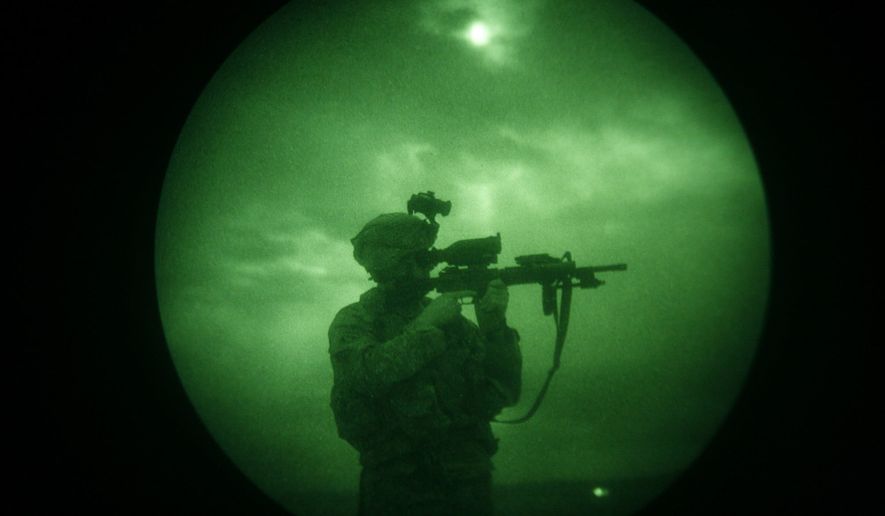Thousands of U.S. military veterans with mental health or behavioral disorders who left the service under less-than-honorable conditions could get a second chance at having their discharges upgraded if a federal judge in Connecticut signs off on a lawsuit settlement with the Army.
The agreement means former soldiers with diagnoses of post-traumatic stress disorder (PTSD), traumatic brain injury (TBI), sexual assault trauma and other issues could soon be eligible for an array of Department of Veterans Affairs benefits that they otherwise wouldn’t have received.
The agreement follows a settlement reached in a nationwide class-action lawsuit filed in April 2017 by Army combat veterans Steve Kennedy and Alicia Carson. Both suffered from service-related PTSD but were given general discharges, according to the complaint.
Mr. Kennedy was in the 82nd Airborne Division in Iraq from June 2007 to July 2008. He took part in several battles with al Qaeda fighters, including two incidents where insurgents detonated suicide vests.
His PTSD symptoms began to emerge after he returned to the United States.
“He became increasingly self-isolating, had trouble sleeping, avoided stressful situations and suffered from survivor’s guilt and depression,” according to the lawsuit. “He had no sense of [the] future, feeling as if he was still waiting for the IED that should have killed him in Iraq.”
He began to drink heavily and expressed suicidal thoughts. Mr. Kennedy was later given a “general” discharge, rather than the more positive honorable discharge, after going AWOL from his unit to attend his own wedding.
“Being a soldier was the center of Mr. Kennedy’s identity during his service and he gave everything he had to do the best job he possibly could,” the lawsuit stated. “Leaving the Army with a judgment saying that his service was less honorable than others’ caused serious damage to his psyche at a time when he was already struggling with serious mental health issues.”
The “bad paper discharge” also meant Mr. Kennedy was ineligible for education benefits under the GI Bill and for state benefits such as property tax exemptions. Many veterans scholarships and work opportunities are open only to those with honorable discharges.
His struggles with depression continued, and medical specialists with the Department of Veterans Affairs and private clinicians ultimately diagnosed PTSD, according to the lawsuit.
Ms. Carson joined the National Guard in 2008 and spent more than 300 days in Afghanistan, carrying out more than 100 missions as a gunner in her infantry battalion. She also had a PTSD diagnosis and received a less-than-honorable discharge.
The Veterans Legal Services Clinic at the Yale Law School took up the case after the Army Discharge Review Board denied their efforts to have the discharges upgraded. Rebecca Brooks, a second-year law student at Yale, said she doesn’t come from a military background but has worked in mental health areas.
“I think it’s kind of a bipartisan agreement that veterans among any group in our society deserve a certain standard of treatment,” she said.
Josh Britt spent four years as an officer in the Marine Corps before he left the service to attend law school at Yale. As a veteran, he understood how intimidating the veterans bureaucracy can be.
“It was very satisfying to work on a lawsuit that might make the system a little more approachable for veteran applicants,” Mr. Britt said.
Although the Army later upgraded the discharges for Mr. Kennedy and Ms. Carson, the class-action lawsuit continued until a federal court in Connecticut last month gave an initial approval for a settlement.
Under the agreement, the Army will reconsider decisions made by the Army Discharge Review Board that denied relief to Iraq and Afghanistan-era veterans with less-than-honorable discharges.
“We think that it’s a significant moment for all the individuals who are going to receive relief,” said Yale law student Deepen Gagneja. “The Army will implement a program to enable applicants to receive a telephonic hearing before the board. We think that could be a huge part of their journey.”
Also in the agreement, discharge review board members will receive additional training for decision-making in cases involving PTSD, TBI and other health conditions.
The Army noted that the discharge upgrades are not guaranteed and that each application will be decided on a case-by-case basis. A hearing to give final approval on the settlement is scheduled for March 24 in U.S. District Court in Connecticut.
Veterans seeking more information about the case can to go to KennedySettlement.com.
• Mike Glenn can be reached at mglenn@washingtontimes.com.




Please read our comment policy before commenting.